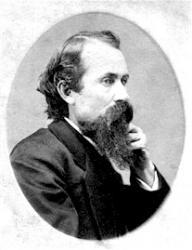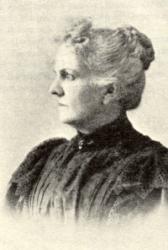Planning worship?
Check out our sister site, ZeteoSearch.org,
for 20+ additional resources related to your search.
- |
User Links
Person Results
‹ Return to hymnal





Export as CSV
Margaret Mackay
1802 - 1887 Hymnal Number: d18 Author of "Asleep in Jesus, blessed sleep" in Primitive Baptist Hymn and Tune Book. Rev. Mackay, Margaret, was born in 1802, and the only daughter of Captain Robert Mackay, of Hedgefield, Inverness. She was married in 1820 to Major William Mackay, of the 68th Light Infantry (afterwards Lt. Colonel) a distinguished officer who died in 1845. Mrs. Mackay died at Cheltenham, Jan. 5, 1887. In addition to various prose works Mrs. Mackay published Thoughts Redeemed; or Lays of Leisure Hours, 1854, which contained 72 original hymns and poems. [Rev. James Mearns, M.A.]
-- John Julian, Dictionary of Hymnology (1907)
Margaret Mackay
John Burton
1773 - 1822 Hymnal Number: d53 Author of "Holy Bible, book divine, Precious treasure, thou art mine" in Primitive Baptist Hymn and Tune Book. Rev. Burton, John, born 1773, in Nottingham, where he resided until 1813, when he removed to Leicester, at which town he died in 1822. He was a Baptist, a very earnest Sunday School teacher, and one of the compilers of the Nottingham Sunday School Union Hymn Book, 1812. This book reached the 20th edition in 1861. The 1st edition contains 43 hymns which have his signature. He is known almost exclusively by one hymn, "Holy Bible, book divine" (q.v.). He was also author of The Youth's Monitor, and other similar productions for the young. Robert Hall wrote a recommendatory preface to one of his works. [Rev. W. R. Stevenson, M. A.]
-- John Julian, Dictionary of Hymnology (1907)
John Burton
Aldine S. Kieffer

1840 - 1904 Hymnal Number: d74 Author of "A Pilgrim Song" in Primitive Baptist Hymn and Tune Book. Rev. Full name Aldine Silliman Kiefer
Aldine S. Kieffer
Laura E. Newell

1854 - 1916 Hymnal Number: d34 Author of "Jesus knows" in Primitive Baptist Hymn and Tune Book. Rev. Born: February 5, 1854, New Marlborough, Connecticut.
Died: October 13, 1916, Manhattan, Kansas.
Daughter of Mr. and Edward A. Pixley, but orphaned as an infant, Laura was adopted by her aunt, then Mrs. Hiram Mabie, who at the time lived in New York. In 1858, the Mabie family moved to a farm south of where Wamego, Kansas, now stands. Two years after the move, Mr. Mabie died, and his wife resumed teaching.
In 1860, Mrs. Mabie accepted a position in Topeka, Kansas, where she taught many years. Under her tutelage, Laura received her education. As early as age 12, Laura was writing rhymes, and two years later her poems began to appear in local newspapers. She had no thought of a literary career; she simply wrote to give vent to her poetical mind.
In 1871, Laura married Lauren Newell, a carpenter from Manhattan, Kansas. They had at least six children, and belonged to the Congregational denomination.
In 1873, Laura was listening to an address by a speaker who lamented the death of "genuine" hymns, and she resolved to try her hand in that line of work. That began a long period of writing songs, sacred and secular, services for all anniversary occasions, cantatas, adapting words to music, and music to words.
"Mrs. Newell is indeed a prolific writer. Her poems number in the thousands. She has had over eight hundred poems published in a single year, a most remarkable record. The great ease with which Mrs. Newell writes is one of her special gifts. Not long since an order, accompanied by music and titles, was sent her for eight poems to suit. At seven o’clock in the evening she sat down to her organ to catch the music. Then she went to her desk, and at ten o’clock the order was ready for the return mail. Her work pleased the publisher so well that he sent her an order for forty-eight additional poems. Mrs. Newell writes several hundred poems annually.
She is a very modest and unpretentious lady, and goes about her daily work as cheerfully as her poems advise others to do. The deeply religious character of the woman stands out boldly in nearly all her work. The next world is apparently as real to her as the present. Her heart is in her work, and to the end of life’s chapter, while able, may she wield her pen to tell the Story to dear to her heart, in verse and song." Hall, pp. 316-17
http://www.hymntime.com/tch/bio/n/e/w/newell_lep.htm
Laura E. Newell
Ada Powell
Hymnal Number: d17 Author of "Safe in his love" in Primitive Baptist Hymn and Tune Book. Rev.
Ada Powell
Caroline L. Smith
1827 - 1886 Hymnal Number: d151 Author of "Tarry with me, blessed Savior" in Primitive Baptist Hymn and Tune Book. Rev. Smith, Caroline Louisa, née Sprague, was born at Salem, Massachusetts, and married to the Rev. Charles Smith, pastor of the South Congregational Church, Andover. Mrs. Smith is the author of:—
Tarry with me, O my Saviour. An Old Man's Prayer. Mrs. Smith's account of this hymn is "About the year 1853 [in the summer of 1852], I heard the Rev. Dr. H. M. Dexter preach a sermon on 'The Adaptedness of Religion to the Wants of the Aged.' I went home and embodied the thought in the hymn 'Tarry with me, 0 my Saviour!' I sent it to Mr. Hallock, for The Messenger. He returned it as 'not adapted to the readers of the paper.' Years after I sent it, without any signature, to the little Andover paper .... I send it to you in its original form, in a little paper of which my sister, Mrs. Terry [Rochester, N.Y.], is editoress." (Hatfield's Poets of the Church, N.Y., 1884, p. 564.) Hatfield gives the full text in 1 stanza of 6 lines. In the Plymouth Collection, 1855, No. 1337, in 5 stanzas of 4 lines, was compiled from st. i., ii., vi., vii. This was repeated in The Sabbath Hymn Book, 1858, and others. Of this text st. ii. is sometimes omitted.
--John Julian, Dictionary of Hymnology (1907)
Caroline L. Smith
David Nelson

1793 - 1844 Hymnal Number: d107 Author of "Shining shore" in Primitive Baptist Hymn and Tune Book. Rev. Nelson, David, M.D., son of Henry Nelson, was born near Jonesborough, East Tennessee, Sept. 24, 1793. He graduated at Washington College, Virginia, in 1810, and took his M.D. degree at Philadelphia in 1812. He acted for some time as a surgeon in the war against Great Britain. During that time he became an infidel, but returning to the faith, he, in 1823, resigned medicine and took up theology, and subsequently became a Presbyterian Minister. He held several appointments, and founded two manual-labour colleges, one at Greenfields, and the second near Quincy, Illinois. He died Oct. 17, 1844. His hymn, "My days are gliding swiftly by" (Death Anticipated), was written in 1835, to be sung to the tune of "Lord Ullin's Daughter." It is exceedingly popular. [Rev. F. M. Bird, M.A.]
--John Julian, Dictionary of Hymnology (1907)
David Nelson
DeWitt Clinton Huntington

1830 - 1912 Person Name: D. W. C. Huntington Hymnal Number: d123 Author of "Over there" in Primitive Baptist Hymn and Tune Book. Rev. Rv DeWitt Clinton Huntington USA 1830-1912. Born at Townsend, VT, one of nine siblings, he attended Syracuse University, NY, and was ordained a Methodist Episcopal minister in 1853. He married Frances Harriett Davis in 1853, and they had three children: Charles, Thomas, and Horace. After her death in 1866, he married Mary Elizabeth Moore in 1868, and they had a daughter, Mary Frances. He pastored in Rochester, NY, (1861-71 & 1876-79), Syracuse, NY, (1873-76), Olean, NY, (1885-89), Bradford, PA, (1882-85 & 1889-91), and Lincoln, NE, (1891-96), where he became a Methodist District Superintendent of relief work. At his pastorate he also personally designed and oversaw construction of a brick sanctuary seating over 1100 people. A depression in 1893 caused him to forego salary for a number of months while pastoring. As things improved, he designed an addition to the church that was finally built two decades later. He was prevailed upon to serve as Chancellor of Nebraska Wesleyan University (1898-1908), at first without pay, and asked more than once to stay after desiring to retire. In 1908 he became Chancellor emeritus and assumed the role of professor of English Bible & Ethics. He also wrote several books, one titled, “Is the Lord among us?”. Another: “Half century messages to pastors and people”. Another: “A documentary history of religion in America since 1877”. He also served on the boards of the local telephone company and Windom Bank. He contracted pleura-pneumonia and died in Lincoln, NE. A Lincoln, NE, street is named for him, as is an elementary school. He was opposed to football, thinking it had no place in a proper Christian institution, but football was re-instituted at the college after his death.
John Perry
DeWitt Clinton Huntington
Joseph Hoskins
1745 - 1788 Hymnal Number: d83 Author of "In thy great name, O Lord, we come" in Primitive Baptist Hymn and Tune Book. Rev. Hoskins, Joseph, was born in 1745, but at what place is unknown. He was a Congregational Minister, who for ten years laboured with great success at Castle Green Chapel, Bristol, and died Sept. 28, 1788, aged 43. During the three years previous to his death ho had written 384 hymns, which in the year following, after correction and revision, were published by Messrs. Moody & Bottomley, Congregational Ministers. The book is entitled, Hymns on Select Texts of Scripture and Occasional Subjects (Bristol, 1789). From this work the following hymns are in common use:—
1. Alas! my [the] Lord my Life is gone. Spiritual darkness and death.
2. Great Light of life, Thou nature's Lord. God, the True Light.
3. In Thy great Name, 0 Lord, we come. Divine Worship.
4. 0 how the hearts of those revive. Joy in Salvation.
5. Prisoners of sin and Satan too. Hope.
6. Saviour of sinners, deign to shine. Christ's light desired.
7. The time is short, ere all that live. Shortness of Time.
Hoskins's hymns are said to have been greatly esteemed by his friends and hearers, but they have little poetic merit. [Rev. W. R. Stevenson, M.A.]
-- John Julian, Dictionary of Hymnology
======================
Hoskins, J., p. 535, ii. Additional pieces from his Hymns, &c, 1789, in common use, in America include:— (1) "Let thoughtless thousands choose the road" (Life in Christ), p. 312; (2) "To-day the Saviour rose" (Easter), p. 364; (3) "Behold, behold the Lamb of God" (Invitation!), p. 242.
--John Julian, Dictionary of Hymnology, Appendix, Part II
============
Hoskins, Joseph, pp. 535, ii., 1571, ii. The following additional hymns by Hoskins are in The New Psalms and Hymns (Presbyterian), Richmond, Va., 1901:—
1. It shall be well, let sinners know. The Promises of God.
2. Sinners, behold the Lamb of God. The Atonement; and in the Book of Worship with Hymns and Tunes ... of the Evang. Lutheran Church, Philadelphia, 1899:—
3. On Christ, by faith, my soul would live, from "Let thoughtless thousands," &c. p. 1571, ii. These hymns are from his Hymns, &c, 1789. [Rev. James Mearns, M.A.]
--John Julian, Dictionary of Hymnology, New Supplement (1907)
Joseph Hoskins
W. T. Dale

1845 - 1924 Person Name: William Thomas Dale Hymnal Number: d188 Author of "Passing under the rod" in Primitive Baptist Hymn and Tune Book. Rev.
W. T. Dale


 My Starred Hymns
My Starred Hymns


